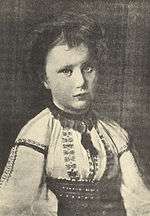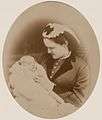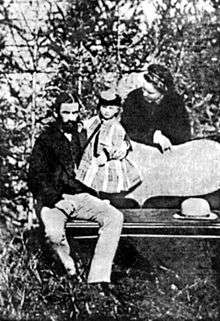Princess Maria of Romania (1870–1874)
Princess Maria of Romania (Maria von Hohenzollern-Sigmaringen, 8 September 1870 – 9 April 1874) was the only child of Carol I of Romania and his wife, Elisabeth of Wied.
| Princess Maria | |||||
|---|---|---|---|---|---|
 Princess Maria, c. 1873. | |||||
| Born | 8 September [O.S. 27 August] 1870 Bucharest, Romania | ||||
| Died | 9 April [O.S. 28 March] 1874 (aged 3) Peleș Castle, Sinaia, Romania | ||||
| Burial | |||||
| |||||
| House | Hohenzollern-Sigmaringen | ||||
| Father | Carol I of Romania | ||||
| Mother | Elisabeth of Wied | ||||
| Religion | Romanian Orthodox[1] | ||||
Life
Princess Maria was born in Bucharest as the first Princess of Romania that was also of the House of Hohenzollern-Sigmaringen, on 8 September [O.S. 27 August] 1870. After a month, in October [O.S. September] 1870, she was baptised as a Romanian Orthodox at the monastery of Cotroceni (near the site of the present-day Cotroceni Palace).[1] In her family, the young princess was nicknamed "Mariechen"[1] (a possible homage to her parents' German heritage) or "Itty" (derived from little).[2] Everyone who knew Maria described her as a beautiful and precocious young child, as she was said to look at maps and identify different countries for fun at the age of only two and a half.[1] It is said that sometime before she died, Princess Maria told her mother that she would someday like to be able to ride a star.[2]
Maria had no prospect of inheriting her father's throne; the 1866 Constitution limited succession to males.
Death
On 5 April [O.S. 24 March] 1874,[1] the Princess became ill with scarlet fever. An epidemic had been ravaging the capital at the time. She was immediately transported to the Peleș Castle. Despite being treated with much care by a doctor named Theodori and many others,[1] the young princess expired on 9 April [O.S. 28 March] 1874 and was buried at the monastery of Cotroceni. At Elisabeth's request, Maria's tombstone read the Bible verse, Luke 8:52:
Weep not; she is not dead, but sleepeth.[1]
The funeral service took place at the Cotroceni Church within the grounds of the Cotroceni Royal Palace.[3] The coffin was covered with white satin, criss-crossed with silver lace ornaments and was as large as one for an adult, because the infant princess' body was enclosed in several decreasing size caskets placed one inside another. After the religious service in the Romanian Orthodox rite, the cortege walked through the palace gardens to the burial place next to the palace church. Those gardens were the favorite playing grounds for the young princess, where only half a dozen days previously she had played with her nurse.[3]
Legacy
Her parents were devastated by her death. On 5 May that year, Carol wrote to Charles Anthony, Prince of Hohenzollern that they intended to move to the Cotroceni Palace, in order to be closer to the resting place of their infant daughter:
Elisabeth's nerves are so shaken that the greatest care is necessary. I must confess to you that I am often anxious myself, and am much depressed by pain, sorrow, and apprehension. I get but very little sleep at night, and have repeatedly heard my poor Elisabeth cry out in her dreams: 'Dead, dead!'. This cry of pain is each time a fresh stab in my wounded heart![3]
In another letter to Lascăr Catargiu,[3] he wrote:
The sweetest memory which our lost daughter has left us as an inestimable treasure is her boundless love for the country in which she was born, a love so strong that despite her tender age she felt the pangs of homesickness during her first stay abroad.[3]
The death of their only child worsened the relationship between Carol and Elisabeth and they did not have any further children. In 1875, Karl Storck created a bust of the sleeping princess which was erected by her tomb. This bust inspired Elisabeth to write many emotional poems.[1] When Queen Elisabeth died in 1916, according to her wishes, her daughter's remains were exhumed and the casket placed on her coffin for the public procession. Mother and daughter were then buried together in the same tomb at the Cathedral of Curtea de Argeș.[1] At the Elisabeta Palace, one can still see an 1880s style piece of furniture that contains a plaster-mold of the infant princess.[2]
Gallery
 Princess Maria and her mother shortly after her birth, in 1870.
Princess Maria and her mother shortly after her birth, in 1870. Maria and her mother in 1871.
Maria and her mother in 1871. Princess Maria with her mother in 1872.
Princess Maria with her mother in 1872. Maria with her parents in 1873.
Maria with her parents in 1873. Princess Maria with her nanny, c. 1873.
Princess Maria with her nanny, c. 1873. Prince Carol I and Princess Elisabeth at Maria's grave shortly after her death.
Prince Carol I and Princess Elisabeth at Maria's grave shortly after her death. Marie's remains being taken to the Cathedral of Curtea de Argeș, in 1916.
Marie's remains being taken to the Cathedral of Curtea de Argeș, in 1916.
Ancestors
| Ancestors of Princess Maria of Romania (1870–1874) | ||||||||||||||||||||||||||||||||||||||||||||||||||||||||||||||||||||||||||||||||||||||||||||||||||||||||||||||||||||||||||||||||||||||||||||||||||||||||||||||||||||||||||||||||||||||||||||||||||||||||||||||||||||||||||||||||||||||||||||||||||||||||||||||||||||||||||||||||||||||||||||||||||||||||||||||||||||||||||||||||||||||||||||||||||||||||||||||||||||||||||||||||||||||||||||||||||||||||||||||||||||||||||||||||||||||||||||||||||||||||||||||||||||||||||||||||||||||||||||||||||||||||||||||||||||||||||||||||||||||||||||||||||||||||||||||||||||||||||||||||||||||||||||||||||||||||||||||||
|---|---|---|---|---|---|---|---|---|---|---|---|---|---|---|---|---|---|---|---|---|---|---|---|---|---|---|---|---|---|---|---|---|---|---|---|---|---|---|---|---|---|---|---|---|---|---|---|---|---|---|---|---|---|---|---|---|---|---|---|---|---|---|---|---|---|---|---|---|---|---|---|---|---|---|---|---|---|---|---|---|---|---|---|---|---|---|---|---|---|---|---|---|---|---|---|---|---|---|---|---|---|---|---|---|---|---|---|---|---|---|---|---|---|---|---|---|---|---|---|---|---|---|---|---|---|---|---|---|---|---|---|---|---|---|---|---|---|---|---|---|---|---|---|---|---|---|---|---|---|---|---|---|---|---|---|---|---|---|---|---|---|---|---|---|---|---|---|---|---|---|---|---|---|---|---|---|---|---|---|---|---|---|---|---|---|---|---|---|---|---|---|---|---|---|---|---|---|---|---|---|---|---|---|---|---|---|---|---|---|---|---|---|---|---|---|---|---|---|---|---|---|---|---|---|---|---|---|---|---|---|---|---|---|---|---|---|---|---|---|---|---|---|---|---|---|---|---|---|---|---|---|---|---|---|---|---|---|---|---|---|---|---|---|---|---|---|---|---|---|---|---|---|---|---|---|---|---|---|---|---|---|---|---|---|---|---|---|---|---|---|---|---|---|---|---|---|---|---|---|---|---|---|---|---|---|---|---|---|---|---|---|---|---|---|---|---|---|---|---|---|---|---|---|---|---|---|---|---|---|---|---|---|---|---|---|---|---|---|---|---|---|---|---|---|---|---|---|---|---|---|---|---|---|---|---|---|---|---|---|---|---|---|---|---|---|---|---|---|---|---|---|---|---|---|---|---|---|---|---|---|---|---|---|---|---|---|---|---|---|---|---|---|---|---|---|---|---|---|---|---|---|---|---|---|---|---|---|---|---|---|---|---|---|---|---|---|---|---|---|---|---|---|---|---|---|---|---|---|---|---|---|---|---|---|---|---|---|---|---|---|---|---|---|---|---|---|---|---|---|---|---|---|---|---|---|---|---|---|---|---|---|---|---|---|---|---|---|---|---|---|---|---|---|---|---|---|---|---|---|---|---|---|---|---|---|---|---|---|---|---|---|---|---|---|---|---|---|---|---|---|---|---|---|---|---|---|---|---|---|---|---|---|---|---|---|---|---|---|---|---|---|---|---|---|---|---|---|---|---|---|---|---|---|---|---|---|---|---|---|---|---|---|---|---|---|---|---|---|---|---|---|---|---|---|---|---|---|---|---|---|---|---|---|---|---|---|---|---|---|---|---|---|---|---|---|---|---|---|---|---|---|---|---|---|---|---|---|---|---|---|---|---|
| ||||||||||||||||||||||||||||||||||||||||||||||||||||||||||||||||||||||||||||||||||||||||||||||||||||||||||||||||||||||||||||||||||||||||||||||||||||||||||||||||||||||||||||||||||||||||||||||||||||||||||||||||||||||||||||||||||||||||||||||||||||||||||||||||||||||||||||||||||||||||||||||||||||||||||||||||||||||||||||||||||||||||||||||||||||||||||||||||||||||||||||||||||||||||||||||||||||||||||||||||||||||||||||||||||||||||||||||||||||||||||||||||||||||||||||||||||||||||||||||||||||||||||||||||||||||||||||||||||||||||||||||||||||||||||||||||||||||||||||||||||||||||||||||||||||||||||||||||
References
- A history in pictures, p. 13/14
- (in Romanian) Principesa Marioara
- Mandache, Diana (2011-11-11). "Maria of Hohenzollern, the Romanian daughter of King Carol I". lostinthemythsofhistory.blogspot.com. Retrieved 2011-12-18.
Bibliography
- Muzeul Național de Istorie a României (2009). The Royal Family: A history in pictures (in Romanian). Cetatea de Scaun. ISBN 978-973-8966-97-0.